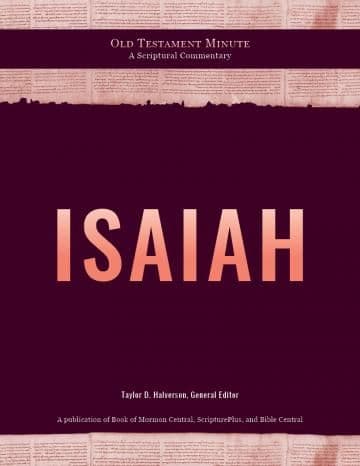Book
34 Chapters

Isaiah’s record begins with a vision which he records concerning Judah and Jerusalem. It is a message of chastisement to all of those living in the Southern Kingdom of Judah, whom the Lord addresses as “my people.”
1:1–4. About two hundred years before Isaiah, the two kingdoms of Judah (South) and Israel (North) were established.
Isaiah’s name in Hebrew is yeshayahu and means “Jehovah saves.”
The Amoz mentioned as Isaiah’s father is not the same as the prophet Amos, a shepherd in Tekoa near Jerusalem, who was a contemporary of Isaiah.
Using one metaphor and symbol after another, Isaiah calls on heaven and earth to “hear,” for Jehovah has spoken. President Russell M. Nelson has repeated this injunction to “hear him,” and for each one of us to learn to recognize and respond to that voice.
List the metaphors as they rush at you and carefully examine them, picturing each one in your mind: the ox and the ass, the sinful nation, a people laden with iniquity, a seed of evil doers, and an entire sick body, wasting away.
Among the many metaphors you may find descriptions of your (and our) current reality. Isaiah describes scenes that he was experiencing which compare to the world’s present predicament. Because of this, his words are truly relevant for us in the chaotic world we live in.
Does the following from Isaiah 1:5–6 seem somehow familiar?
Note how verse 7 describes strangers as invaders of Judahite land. This description brings other conquests to mind, such as the Taliban takeover as they “devoured” Afghanistan in August and September of 2021.
Note the list of metaphors in verse 8. These shelters, including the besieged city, would have offered little protection from an invading army. As verse 9 explains, the Lord did not allow Judah to be completely destroyed but he intended a remnant to continue, possibly symbolized by the solitary metaphors he describes.
Verses 9–10 are a perfect example of how Isaiah draws the reader into his narrative almost seamlessly.
First, he suggests that except for the remnant, “we should have been as Sodom, and we should have been like unto Gomorrah.”
In verse 10 he addresses them directly: “Hear the word of the Lord, ye rulers of Sodom, give ear unto the law of our God, ye people of Gomorrah.”
The following verses describe in detail the vain rituals these people are performing without intentional devotion. Isaiah specifically lists vain offerings or gifts, incense, and Sabbath observance, and in verse 15 even condemns their prayers made in vain. The Lord tell them, as they raise their hands in their many prayers, “I will not answer; your hands are full of blood.”
1:16–20. In short, Isaiah is telling everyone to repent. In the law of Moses, washing ordinances were part of the process of purification or becoming clean, and Isaiah refers to these ordinances here.
Then we read one of the most quoted of Isaiah’s words, in the middle of this exhortation to repent.
Who better to explain the Atonement of Jesus Christ than Jehovah, Jesus Himself, the God of the Old Testament?
1:18–20. Both the word “eat” and the word “devoured” come from the same Hebrew word, achal. However, in the first instance you are the one eating, whereas in the second instance you may be the one eaten or devoured.
1:22. This verse describes Jerusalem by using the metaphors of silver and wine, both of which have become worthless because of impurities. Verse 23 goes on to describe the corruption. In verse 25 the Lord says that he will “purely purge away the dross and take away all thy tin,” and in verse 26, “I will restore thy judges as at the first, and thy counselors as at the beginning: afterward thou shalt be called, the city of righteousness, the faithful city. Zion shall be redeemed with judgement, and her converts [those who are repentant] with righteousness.”
1:29. “Oaks” (Hebrew elim) may point to the similar Hebrew word for “gods,” referencing the practice of some Israelites as they worshipped false gods or idols in gardens and groves.
Book
34 Chapters
Items in the BMC Archive are made publicly available for non-commercial, private use. Inclusion within the BMC Archive does not imply endorsement. Items do not represent the official views of The Church of Jesus Christ of Latter-day Saints or of Book of Mormon Central.